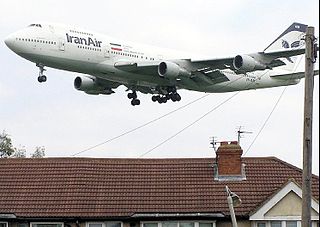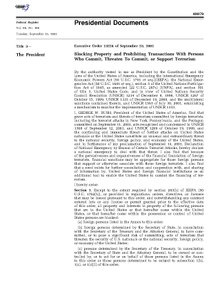
The Office of Foreign Assets Control (OFAC) is a financial intelligence and enforcement agency of the United States Treasury Department. It administers and enforces economic and trade sanctions in support of U.S. national security and foreign policy objectives. Under presidential national emergency powers, OFAC carries out its activities against foreign governments, organizations, and individuals deemed a threat to U.S. national security.
Foreign Terrorist Organization (FTO) is a designation for non-United States-based organizations deemed by the United States secretary of state, in accordance with section 219 of the Immigration and Nationality Act of 1965 (INA), to be involved in what US authorities define as terrorist activities. Most of the organizations on the list are Islamist extremist groups; the rest are nationalist/separatist groups, or Marxist militant groups.

United States sanctions are financial and trade restrictions imposed against individuals, entities, and jurisdictions whose actions contradict U.S. foreign policy or national security goals. Financial sanctions are primarily administered by the U.S. Department of the Treasury's Office of Foreign Assets Control (OFAC), while export controls are primarily administered by the U.S. Department of Commerce's Bureau of Industry and Security (BIS).

The International Emergency Economic Powers Act (IEEPA), Title II of Pub. L. 95–223, 91 Stat. 1626, enacted October 28, 1977, is a United States federal law authorizing the president to regulate international commerce after declaring a national emergency in response to any unusual and extraordinary threat to the United States which has its source in whole or substantial part outside the United States. The act was signed by President Jimmy Carter on December 28, 1977.

The Tamils Rehabilitation Organisation (TRO) was established in 1985 in Tamil Nadu in southeastern India by Sri Lankan Tamil refugees fleeing the violence in North and East Sri Lanka. Its initial operation was to provide relief to the refugees in India. After the signing of the Indo-Sri Lanka Accord and the subsequent fighting between the LTTE and the Indian Peace Keeping Force, TRO moved its operation and headquarters to Jaffna in Northern Sri Lanka.

Asset forfeiture or asset seizure is a form of confiscation of assets by the authorities. In the United States, it is a type of criminal-justice financial obligation. It typically applies to the alleged proceeds or instruments of crime. This applies, but is not limited, to terrorist activities, drug-related crimes, and other criminal and even civil offenses. Some jurisdictions specifically use the term "confiscation" instead of forfeiture. The alleged purpose of asset forfeiture is to disrupt criminal activity by confiscating assets that potentially could have been beneficial to the individual or organization. Asset forfeiture was found to generally increase with the percentage of the assets retained depending on electoral incentives.
The Islamic Resistance Support Association is a charity used to raise funds for Hezbollah and pay for the services it offers in Lebanon.

The al-Aqsa Foundation is an entity established in 1991 as a non-profit organisation that some Western governments have said is linked to Hamas. In 2003 the U.S. Treasury Department designated the foundation as a "Specially Designated Global Terrorist (SDGT) entity."

Following the Iranian Revolution, the United States has since 1979 applied various economic, trade, scientific and military sanctions against Iran. United States economic sanctions are administered by the Office of Foreign Assets Control (OFAC), an agency of the United States Department of the Treasury. As of 2017, United States sanctions against Iran include an embargo on dealings with the country by the United States, and a ban on selling aircraft and repair parts to Iranian aviation companies.

Yassin Abdullah Kadi is a Saudi Arabian businessman. A multi-millionaire from Jeddah, Kadi trained as an architect in Chicago, Illinois. He is the son-in-law of Sheikh Ahmed Salah Jamjoom, a former Saudi Arabian government minister with close ties to the Saudi royal family.

Muhammad Abdallah Hasan Abu-al-Khayr, also known as Abu Abdallah al-Halabi, was a citizen of Saudi Arabia notable for being named on its 2009 list of most wanted suspected terrorists. He was alleged to be one of Osama bin Laden's bodyguards, and one of his sons-in-law.

Mohammed Abdel Karim Al Ghezali is a citizen of Yemen who was one of the founders of Al-Qaeda in the Arabian Peninsula in 2009 and remains one of its senior leaders. CBS News reported that Al Ghezali appeared in a September 2009 fundraising video with Said Ali al-Shihri, the second in command of Al-Qaeda in the Arabian Peninsula.
A Specially Designated Global Terrorist (SDGT) is a person or entity that has been designated as such by the United States Department of State or the U.S. Department of the Treasury. An SDGT designation is made under authority of U.S. Executive Order 13224 of September 23, 2001, as amended by Executive Order 13268 of July 2, 2002, and Executive Order 13284 of January 23, 2003, and Title 31, Parts 595, 596, and 597 of the U.S. Code of Federal Regulations, among other U.S. laws and regulations. The main regulatory framework underlying the SDGT designation was established two weeks after the September 11 attacks in 2001 by U.S. President George W. Bush.
A Specially Designated Terrorist (SDT) is a person who has been designated by the U.S. Secretary of the Treasury to be a specially designated terrorist under notices or regulations issued by the Office of Foreign Assets Control (OFAC), under the U.S. Treasury Department.
The Union of Good, also known as the Charity Coalition, is an umbrella organization consisting of over 50 Islamic charities and funds which allegedly "funnels" money to organizations belonging to Hamas, which currently rules the territory of the Gaza Strip. Hamas, which characterizes itself as an "Islamic resistance movement against Israeli occupation", which itself started as a charity.

The Foreign Narcotics Kingpin Designation Act, better known as the Kingpin Act, is landmark federal legislation in the United States intended to address international narcotics trafficking by imposing United States sanctions on foreign persons and entities involved in the drug trade.

The North Korea Sanctions Enforcement Act of 2013 was a bill that increased the sanctions against North Korea for pursuing nuclear proliferation.

International sanctions against Afghanistan were implemented by the United Nations in November 1999. The sanctions were initially aimed at terrorists, Osama bin Laden and members of Al-Qaeda. The United States, the United Kingdom and the European Union also impose sanctions on Afghanistan.
Ali Youssef Charara is a Lebanese businessman and financier, best known for his involvement in the telecommunications sector and his financial ties to the militant group Hezbollah. Charara has been implicated in supporting Hezbollah through commercial ventures and has faced sanctions from multiple governments as a result.











